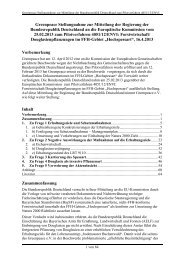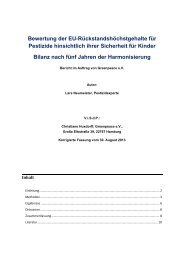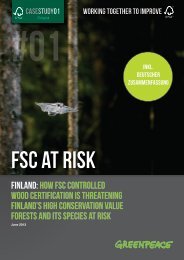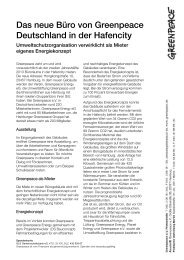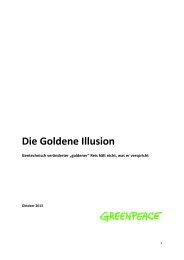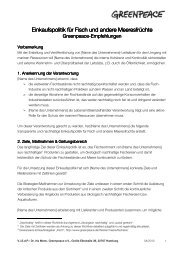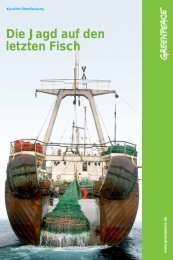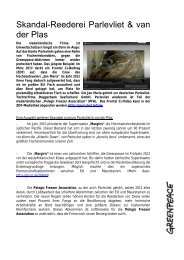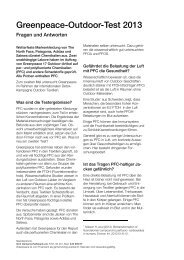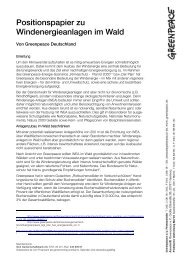Untitled - Greenpeace
Untitled - Greenpeace
Untitled - Greenpeace
You also want an ePaper? Increase the reach of your titles
YUMPU automatically turns print PDFs into web optimized ePapers that Google loves.
CARVING UP THE CONGO<br />
43<br />
TIPPING THE SCALES: THE COST OF<br />
INDUSTRIAL LOGGING FAR OUTWEIGHS ITS<br />
CONTRIBUTIONS TO DEVELOPMENT<br />
The people of the DRC are some of the<br />
poorest in the world. According to the United<br />
Nations Development Programme (UNDP),<br />
nearly 90% of the population lives on less<br />
than $1 a day. 239 Today the economy of the<br />
DRC is largely based on subsistence activities,<br />
which account for 80% of the economy. 240<br />
Of the approximately 62.5 million people 241<br />
in the DRC, about 40 million 242 are<br />
dependent on the country’s forests – not for<br />
money gained from the international logging<br />
trade, but for daily survival: food, medicine,<br />
energy, building materials and the value of<br />
non-timber forest products.<br />
The DRC has Heavily Indebted Poor Country<br />
status: its burden of debt remains huge and<br />
the cost of servicing this debt (a third of it<br />
owed to multilateral institutions such as the<br />
World Bank and IMF) 243 will account for up to<br />
40% of public revenues in 2007, 244 leaving<br />
little to be spent on the provision of basic<br />
services or the restoration of desperately<br />
needed infrastructure after the devastation of<br />
the war.<br />
As for guarantees of a sustainable environment<br />
(one of the UN Millennium Development<br />
Goals), according to the UNDP the absence of<br />
rational exploitation of natural resources and<br />
the associated economic changes have had a<br />
clearly negative impact. 245<br />
Even if industrial logging were to be conducted<br />
in a lawful, transparent and sustainable<br />
manner, the value of the goods the forest<br />
provides to the wider population would still far<br />
outweigh that of the logging industry. For<br />
2006, the industry’s contribution to state<br />
revenues was estimated to be $10.6 million<br />
on an assumed 500,000m 3 timber harvest. 246<br />
Forestry revenues are contributing just 0.7%<br />
of GNP. 247<br />
A 2005 report presenting the proposed World<br />
Bank-managed Trustfund 248 on good<br />
governance in the DRC forestry sector<br />
suggests that the sector has the potential to<br />
reach harvest levels of 5 million m 3 , and be<br />
worth $100 million a year to the State. 249<br />
However, the area of rainforest that would<br />
need to be opened up to achieve such levels,<br />
and the related environmental damage, would<br />
be massive. Further, more recent World Bank<br />
reports concede that production levels are<br />
unlikely to reach more than 20% of that figure<br />
over the next decade. 250<br />
In contrast, the value of the forest and forest<br />
products such as food, medicine and building<br />
materials to the people of the DRC is largely<br />
unquantifiable. The equivalent economic value<br />
of these non-timber forest products is<br />
estimated at more than $2 billion a year. 251<br />
Moreover, scientists have confirmed that<br />
many of the medicinal plants found in the<br />
forests have significant therapeutic value. 252<br />
Yet the continued availability of these goods is<br />
jeopardised by industrial logging, which both<br />
degrades the forest that provides them and<br />
impedes forest people’s access to them, while<br />
offering little in return beyond promises of<br />
local development projects that are fulfilled at<br />
best in part and often not at all. For forest<br />
dwellers, indeed, the arrival of the loggers may<br />
herald not just lost resources but new burdens<br />
of social conflict, prostitution and disease.<br />
The conclusion, inevitably, is that the industry’s<br />
overall effect on the country’s social wellbeing<br />
will continue to be negative. 253<br />
‘I recently returned to a<br />
village where I worked as a<br />
young forester. When I left<br />
25 years ago, it was with the<br />
promise that logging would<br />
bring a future of social and<br />
economic development.<br />
Timber was the only resource<br />
these villages had to ignite<br />
development. And today,<br />
commercial timber is gone.<br />
The same families are there.<br />
They were poor 25 years ago<br />
and they are poor today. But<br />
today, they have less forest<br />
and less hope. They feel<br />
cheated by the government,<br />
the private sector, the local<br />
chiefs and by me. They feel<br />
let down. And I believe that in<br />
many ways they are right. We<br />
are all responsible for letting<br />
them down.’ 254<br />
Giuseppe Topa, Africa forest<br />
specialist, the World Bank,<br />
2002<br />
The international community has been<br />
presenting highly optimistic estimates of<br />
potential future logging revenues to the DRC<br />
Government. Such optimism is both dangerous<br />
and misleading as it encourages the misguided<br />
belief that logging will contribute to<br />
development.<br />
©<strong>Greenpeace</strong>/Davison



